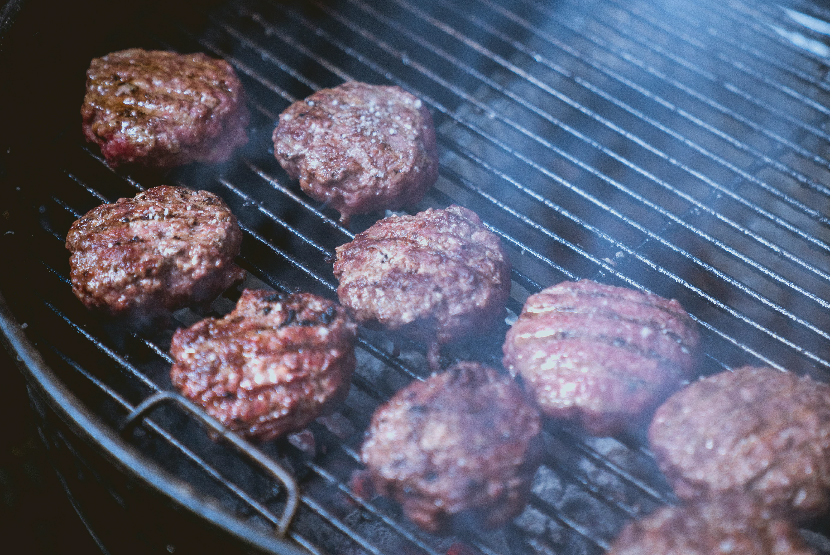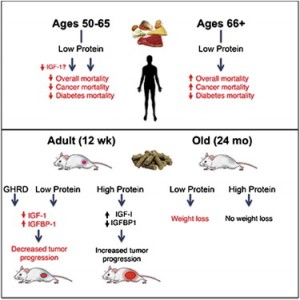I recently purchased a brand of high-protein cows milk, a lactose-free with 50% more protein and 50% less sugar than traditional milk. The lactose-free is essential for me, and lower milk sugar is an added and unexpected benefit, but what about all this emphasis on protein? Remember the dairy industry’s Got Milk campaign? It’s now Got Protein. As this new milk brand proves, protein has never been to popular, but does this mean we are healthier for it? A new study published in Cell Metabolism in March 2014 may surprise you.
First let’s look at consumer/patient attitudes toward protein. Consumer research from Mintel says that 46% of all meal replacement cite protein as very important. The reason is satiety. For as many as 87% of those surveyed, satiety was an important attribute. Nearly every best selling diet book in America says eat protein for weight management and blood sugar control. Protein is also widely prescribed to reduce muscle-weakening sarcopenia. But does it do anything for longevity?
The study is based on the knowledge that mice and humans with growth hormone receptor/IGF-1 deficiencies display major reductions in age-related diseases. Because protein restriction reduces GHR-IGF-1 activity, researchers examined links between protein intake and mortality.
Here are the study parameters:
- Subjects consumed 1,823 calories on average per day,
- Carbohydrate consumption 51%,
- Fat 33%,
AND three protein groups:
- High-protein group (20% or more of calories from protein),
- Moderate-protein group (10–19% of calories from protein) and,
- Low-protein group (less than 10% of calories from protein).
- Respondents aged 50–65 reporting high protein intake had a 75% increase in overall mortality and a 4-fold increase in cancer death risk during the following 18 years.
- These associations were either abolished or attenuated if the proteins were plant derived.
- Conversely, high protein intake was associated with reduced cancer and overall mortality in respondents over 65, but a 5-fold increase in diabetes mortality across all ages.
Mouse studies confirmed the effect of high protein intake and GHR-IGF-1 signaling on the incidence and progression of breast and melanoma tumors, but also the detrimental effects of a low protein diet in the very old.”
These results suggest that low protein intake during middle age followed by moderate to high protein consumption in old adults may optimize health-span and longevity.
- High protein intake is linked to increased cancer, diabetes, and overall mortality
- •High IGF-1 levels increased the relationship between mortality and high protein
- •Higher protein consumption may be protective for older adults
- •Plant-derived proteins are associated with lower mortality than animal-derived proteins
So in a high-protein nutshell (couldn’t resist), the research suggests that as we age, our eating habit should shift. People younger than 65 should avoid high protein animal-based diets and eat mostly plant-based proteins.This sounds like Micheal Pollan’s advice, “Eat food. Not too much. Mostly plants.”
Secondly, at age 65, we should try to consume more protein as it improves longevity and reduces overall cancer mortality, unless one is at high risk for diabetes.
If this study is an interesting to you as I found it, I encourage you to link over (after reading this) to Naturopath Jacob Schor’s commentary. Schor is in practice in Denver on the board of directors of both the Oncology Association of Naturopathic Physicians and the American Association of Naturopathic Physicians. He agrees the cohort study raises some interesting questions about the type of protein we should be eating at various life stages.
The differences in mortality reported in this study are not small,” he writes. “The researchers found that eating a diet rich in animal proteins during middle age makes you four times more likely to die of cancer than someone with a low-protein diet; this is a an increased risk comparable to smoking.”
He also has some thought provoking ideas on the issue of diabetes and protein and implications for this news in your practice. Link here to Schor’s commentary in Natural Medicine Journal.
A lady never admits her age, but I guess, it’s coconut milk for me from now on.







